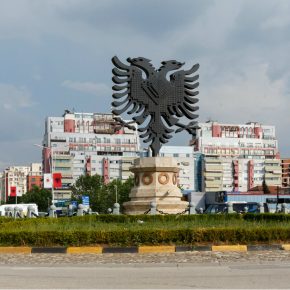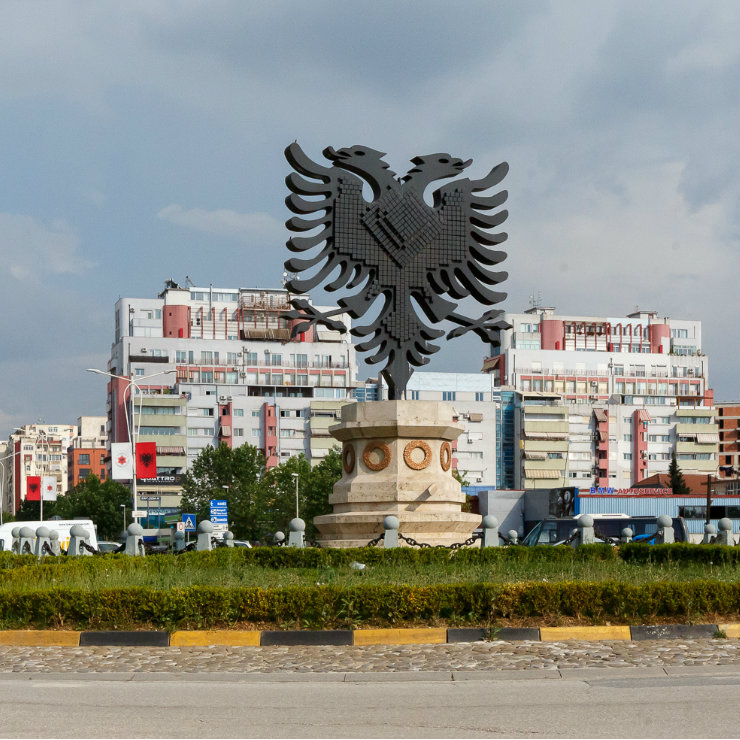Tydzień w gospodarce
Category: Trendy gospodarcze

Tirana, Albania (Poland’s MFA, CC BY-NC)
In a survey conducted in early 2018, 49 per cent of Albanian entrepreneurs said the 2017 business environment was very unfavorable or unfavorable. A third of senior executives described the business climate as neutral, with only one in six companies saying the business environment was favorable (17 per cent) or very favorable (0.7 per cent), according to a survey by the American Chamber of Commerce in Albania.
According to Trading Economics Albania’s industrial confidence index increased to 2.4 in Q1’18 from a revised 0 in the previous period. It was the highest reading since Q2’17, as expectations increased regarding selling prices (3.2 from 2.1 in Q4’17), employment (13 from 11.7) and order books (-4.3 from -10.4).
Additionally, an improvement was seen in production over the past three months (16.6 from 11.8) and regarding financial situation (17.4 from 14.9). Business Confidence in Albania averaged -7.63 Index Points from 2002 until 2018, reaching an all-time high of 4.80 Index Points in the third quarter of 2006 and a record low of -26.40 Index Points in the first quarter of 2009.
The European Commission (EC) report on Albania shows that a strong polarization persisted in the political establishment. “Parliamentary activities were affected by a prolonged boycott by the opposition in early 2017, which also delayed the appointment of the judicial vetting institutions,” the EC wrote.
“In May, an agreement between the main ruling party and the opposition allowed resuming parliamentary activities, triggering some changes to the electoral legislative framework. This was conducive to the smooth organization of the general elections in June, although a number of OSCE/ODHIR recommendations still remained outstanding. Some progress was made towards improving the functioning of the National Council for Civil Society. Additional efforts are needed to better embed civil society organizations as part of an inclusive policy dialogue.”
The EC also noted that Albania is “moderately prepared” to reform its public administration. “Efforts continued, resulting in some progress in the efficiency and transparency of public services delivery, training of civil servants, more transparent recruitment procedures, and the overall strengthening of merit-based civil service procedures. Consolidation of these achievements should advance further, to ensure a more efficient, depoliticized, and professional public administration.”
The report also highlighted that Albania has maintained a high level of preparation in the fight against corruption. “Good progress was made, notably with the adoption of amendments to the criminal procedure code. A chain of specialized anticorruption bodies, including a special prosecutor office, is being established. The number of final convictions involving junior or middle-ranking officials has increased compared to the previous reporting period. Convictions of high-level officials occurred mostly in the judiciary (judges and prosecutors); however, final convictions for high ranking officials remain overall very low. Corruption remains prevalent in many areas and continues to be a serious problem.”
“Albania has made some progress and is moderately prepared in developing a functioning market economy,” according to EC which notes that the public debt-to-GDP ratio and the current account deficit have been reduced.
“Economic growth increased further and unemployment decreased but is still high. Non-performing loans (NPLs) in the banking sector have been reduced, but bank lending to businesses remains sluggish. Reforms crucial to improving the business environment progressed but require further efforts, including reduction of the informal economy. The comprehensive judicial reform advanced but needs to be fully implemented. The new bankruptcy law entered into force and should strengthen the insolvency regime. However, business-relevant regulations remained cumbersome and shortcomings in the rule of law continued to hamper businesses and deter investments.”
Albania has made some progress and has some level of preparation in terms of capacity to cope with competitive pressure and market forces within the EU. Specifically, progress was made on energy and transport infrastructure and digitalization, although shortcomings remain which hinder Albania’s competitiveness and trade. The quality of education needs to be raised at all levels, not least to better equip people with skills that the labor market needs. Albania’s capacity for research, development and innovation remains low.
The EC report also noted that Albania has continued to align its legislation to EU requirements in a number of areas, enhancing its ability to take on the obligations of membership.
“The country is moderately prepared in many areas, such as in financial control, education and culture, or has some level of preparation, including in the areas of public procurement and statistics. Albania will need to continue its efforts as regards the overall preparations for adopting and implementing the EU acquis.”
“It should continue work on the development of the transport and energy networks, also with a view to improving connectivity throughout the region. The administrative capacity and professional standards of bodies which would be charged with the implementation of the acquis need to be strengthened and the independence of regulatory bodies safeguarded. Enhancing transparency and accountability, in particular ensuring the effective, efficient and transparent functioning of the public procurement system and public finance management, remains essential. Albania has continued to fully align with all EU common foreign and security policy positions and declarations.”

